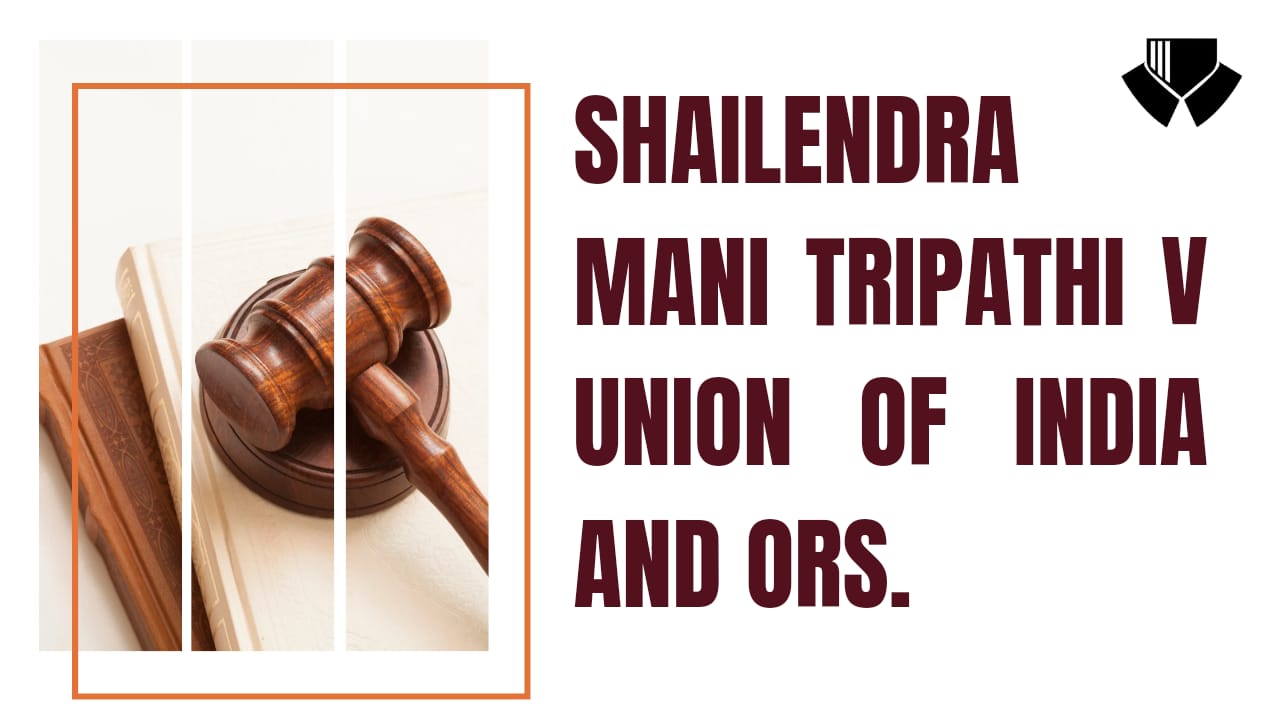This case Analysis is done by Prakash Singh, a 5th year law student at Narayan School of Law, GNS University.
Title of the case: Shailendra Mani Tripathi vs. Union of India
Citation: Writ Petition (Civil) No. 172/2023
Court: Supreme Court of India.
Petitioner: Shailendra Mani Tripathi.
Respondent: Union Of India and ORS.
Bench: Hon’ble Chief Justice of India, DY. Chandrachud, Hon’ble Mr. Justice Pamidighantam Sri Narasimha, Hon’ble Justice J. B. Pardiwala.
Date of judgement: February 24, 2023
Involved legislation and Article of the Constitution: Article 32 and the Maternity Benefit Act 1961.
Overview
The core subject matter of the case is the legal right to paid menstrual leave for female students and working women across India. Granting paid menstrual leave to women will serve as a great matter of tussle between the feminists and those who support the idea, as it will be a radical change in society. The court supported the interfering argument in the case by a law student named Anjali Patel that if in India, paid leave during the menstrual period is accepted for working women and female students, then it would serve as a great defence for not hiring women in the services and it can affect the participation of women in the working force of the country. Feminists also support this opinion. The petitioner called it a violation of Article 14 as it discriminates against women in the name of the policy. The court, after analysing various aspects of the case, ruled that the matter cannot be directly governed by the judiciary as it includes certain dimensions of policy-making, so it would be better to treat the matter more efficiently if it were represented in front of the policymakers before consideration in the court. However, the bench stated in the order that the petitioner can represent in the matter or file a representation before the Union Ministry of Women and Child Development.
The matter of paid menstrual leave for women is not so new, but it can be traced back to the early years of the 20th century. Since the year 1912, the southernmost beautiful state of India, Kerala, has had this provision of granting menstrual leave to female students. Also in the state of Bihar, there has been a provision for 2 days of menstrual leave for working women since 1922. Zomato, Byju’s, Swiggy, and other technology startups have started offering paid menstrual period leave to women working their services lately.
Facts of the case
A PIL was filed by Adv. Shailendra Mani Tripath before the Supreme Court, seeking paid leave during the menstrual period, for female students and working women throughout India. The petitioner was willing to bring the attention of the court to the issue so that a concern that has been a great struggle in the past to move forward, can be settled in an appropriate manner. It was emphasized in the plea that Dr Shashi Tharoor introduced the Women’s Sexual, Reproductive, and Menstrual Rights Bill in which it was stated that sanitary pads would be available for free by governmental authorities for women. Additionally, the Menstruation Benefits Bill 2017 was proposed in the legislature in 2022 on the first day of the budget session, which was not taken into consideration by naming it as an ‘Unclean Topic’. Thus, the petition in the plea has clearly stated the unwillingness of the legislature to take this issue of granting paid leave for the menstrual periods for women into consideration.
Issues
- Whether the question of granting women the right to paid leave during their menstrual period falls under the scope of policymakers; or the legislature?
- Will the Right to paid leave during the menstrual period affect women’s employment badly?
- Should the Concern of offering paid leave to women during their menstrual period be settled in court?
Petitioner’s Side
- Concern about offering paid leave to women during the menstrual period has not yet been taken into consideration by the legislature.
- There is a highlighted intention of the legislature not to formulate any policy regarding the same; this statement was backed by the following:
Dr. Shashi Tharoor introduced the Women’s Sexual, Reproductive, and Menstrual Rights Bill, in which it was stated that sanitary pads would be available for free by governmental authorities for women. Additionally, the Menstruation Benefits Bill 2017 was proposed in the legislature in 2022 on the first day of the budget session, which was not taken into consideration by naming it as an ‘Unclean Topic’.
- There is an intentional distinction between women and men in various laws. In accordance with the rule that “like should be treated alike”Paid menstrual leave for women is so much more significant.
Respondent’s Side
- The right to paid leave during the menstrual period can compel employers not to hire women.
- It can affect the women employed ratio adversely.
- The case involved such dimensions that required the formulation of policy.
Judgement
On February 24, 2023 the Supreme Court of India refused to accept the petition filed by Adv. Shailendra Mani Tripathi seeking paid menstrual leave for women across India. The Bench, comprising Hon’ble the Chief Justice Of India DY. Chandrachud, Hon’ble Mr Justice Pamidighantam Sri Narasimha, and Hon’ble Justice J. B. Pardiwala, opine that the present matter involves various aspects and dimensions of policy and governance, thus the representation must be filed before the Ministry of Women and Child Development.
Conclusion
Spain became the first country in Europe in which the provision of menstrual leave of three to five days was effectively executed in February 2023. Many other countries, like Japan, Indonesia, South Korea, Taiwan, Vietnam, and Zambia, offer menstrual leave to women.
In the opinion of Ashutosh Singh, a doctoral researcher at the Centre of Social Medicine and Community Health at JNU, New Delhi, India and the entire globe require change and transformation in the interest of menstrual health.
Overall, the issue is highly sensitive and significant enough to be considered on social grounds. Menstruation, which is considered as an unclean topic even to discuss, we need a radical transformation in society so that this concern can effectively be dealt with, and women can attain their actual status of equality and can live in a place that is safe, healthy and where they can lead their life to the fullest.


